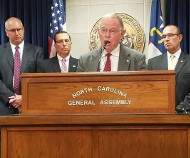6/17/2016
North Carolina Lawmakers Revolt Against Interstate TollingNorth Carolina House of Representatives passes legislation that would torpedo plan to add tolls to interstate highway.

It is now up to the North Carolina state Senate to decide whether tolls will be imposed on the Interstate 77. Earlier this month, the state House of Representatives voted 81 to 27 in favor of a measure canceling the contract that the North Carolina Department of Transportation (NCDOT) entered with the Spanish firm Cintra to run high occupancy toll (HOT) lanes on the freeway. State Senator David Curtis (R-Gaston) is now trying to round up support among his colleagues to pass the bill and put it on the governor's desk.
"I am excited to introduce this legislation to cancel the toll contract on I-77," Curtis told Facebook supporters in April. "I appreciate the many citizens and civic groups that have contacted me and look forward to continue working with you until this contract is cancelled."
The House-passed measure includes provisions that would pay the fee for the contract cancellation, prohibit any future tolling of I-77 and suspend several related projects. In 2014, NCDOT signed the deal with Cintra to toll 26 miles of the freeway through Mecklenburg and Iredell Counties. Although the contract gave the Spanish company the majority of the tolling profits for the next fifty years, nearly two-thirds of the $655 million construction pricetag will be covered by public funds, including $289 million in direct federal loans and bonds, plus $95 million in state cash. Section 2.2.2 of the contract states that NCDOT will not report these payments to the IRS so that they will not be considered taxable income for Cintra.
The contract is designed to maximize profit for Cintra, with profits above a pre-set level being partially shared with NCDOT. For example, the deal includes a non-compete clause in which the state DOT must pay Cintra a financial penalty if it makes any improvements to general purpose lanes near the toll route. The penalty is meant to discourage expanding or otherwise improving untolled lanes, which are cryptically described in Section 13.2.6 of the contract as an "unplanned revenue impacting facility."
A presentation to the International Bridge, Tunnel and Turnpike Association (IBTTA) summit in the Czech Republic in 2014 sheds light on the purpose of contract clauses that limit the ability to improve general purpose lanes (read presentation, 3mb PDF file).
"The revenue potential and overall financial success of priced express lanes depends, in part, on the operational failure of the adjacent general purpose lanes," IBTTA past president Susan Buse said. "Maximum revenue from the express lanes often comes at prices which yield traffic in the lanes that is well below 'free flow' capacity."
No vote has been scheduled on the bill in the state Senate.


